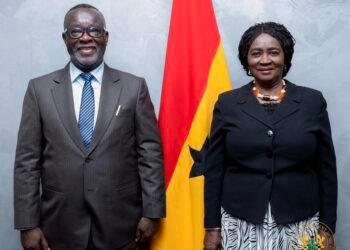The IMANI Centre for Policy and Education has offered a sobering, yet constructive critique of the state of Ghana’s democracy, with a pointed focus on the role and relevance of opposition parties.
As the nation continues to grapple with institutional fragilities, declining public trust, and an entrenched two-party political structure, IMANI’s analysis underscores the critical call for renewal.
It urged opposition parties, particularly the New Patriotic Party (NPP) after its stunning defeat in the 2024 general elections, to introspect, recalibrate, and recommit to the core principles that sustain democratic governance.
“Ghana’s democracy—long hailed as one of Africa’s most enviable systems of governance—is built on a foundation of free elections, peaceful transitions, and the active participation of its citizens.
“However, as pressures mount from institutional challenges, waning public trust, and a political landscape increasingly dominated by a duopoly of power, the role of opposition parties becomes ever more crucial”.
IMANI Centre for Policy and Education
According to the leading policy think-tank, opposition parties are not mere contenders for power but are integral to the functioning of democratic institutions.
The group argued that the opposition parties’ mandate extends beyond partisan rivalry to include the all-important “police patrol” role—scrutinising government policies, exposing inefficiencies and corruption, and offering robust policy alternatives.
In this watchdog capacity, IMANI posited that opposition parties serve as essential safeguards against executive overreach and public sector excesses.
However, the ability of opposition parties in Ghana to perform this role effectively has come under scrutiny.
According to IMANI, the NPP’s dramatic electoral loss in 2024 has raised serious questions about its capacity to provide credible alternatives to the ruling National Democratic Congress (NDC).

IMANI’s analysis suggested that this defeat must not be viewed solely as a political failure, but as a wake-up call—a moment that demands strategic rethinking and a rededication to public service, not political survival.
Rebuilding Credibility Through Public Engagement
To remain relevant and effective, opposition parties must anchor themselves in the daily realities of Ghanaians.
IMANI underscored the importance of grassroots engagement—interacting directly with communities, listening to their grievances, and crafting policy responses that reflect the people’s urgent needs. It is in these everyday encounters that trust is built and credibility restored.
The analysis emphasised a practical approach to grassroots politics: establishing functional ward branches, organising town hall meetings, participating in social media discourse, and forging collaborations with civil society organisations.
“In any pluralistic society, dissent and diversity of opinion are inevitable—and invigorating. Opposition parties channel the grievances, aspirations, and diverse views of the citizenry.
“By engaging with civil society, grassroots organizations, and everyday Ghanaians, these parties act as amplifiers of public sentiment, ensuring that government policies remain responsive to the people’s needs”.
IMANI Centre for Policy and Education
The Dilemma of the Political Duopoly
IMANI further acknowledged that Ghana’s political landscape remains dominated by the NDC and NPP, leaving limited room for alternative voices, yet noted that, even within this duopoly, internal contradictions abound.
According to the policy think-tank, parties that fiercely criticise governance failures while in opposition often struggle to maintain ideological consistency once they assume power.

This credibility gap, IMANI argued strongly, not only weakens public trust but also reinforces perceptions of political opportunism.
Smaller opposition parties, for their part, face a Sisyphean task in breaking through the noise. Overcoming these constraints, according to IMANI, requires both internal reform and strategic collaboration among opposition factions.
A Crisis of Trust and Vision
Perhaps the most alarming challenge identified by IMANI is the erosion of public trust in political institutions.
“Surveys have highlighted a declining trust in political institutions, which feeds into a broader narrative of political paralysis. Opposition parties must find innovative ways to break this cycle by restoring a sense of hope, transparency, and genuine accountability among the electorate.”
IMANI Centre for Policy and Education
In this environment, IMANI strongly opined that opposition parties cannot afford to simply critique the ruling government—they must inspire hope.
According to IMANI, this means crafting clear, realistic, and compelling policy proposals, adding that whether it is tackling economic inequality, confronting youth unemployment, or fixing broken public services, opposition parties must present themselves as capable stewards of national transformation.
IMANI further argued that opposition parties’ platforms should not be rhetorical wish lists but detailed, costed roadmaps that articulate how they would govern differently and better.
IMANI emphasized the need for opposition parties to adapt to this shift, investing in modern communication strategies that resonate with a digitally savvy, youthful population.
“Rapid changes in media consumption call for a modern approach to political communication. Opposition parties must harness the power of digital media to disseminate their ideas widely, counter government narratives, and engage with a younger, more dynamic electorate.
“This digital transformation is necessary to counteract negative portrayals and build a positive public image.”
IMANI Centre for Policy and Education
Internal Democracy and Institutional Reforms
Critically, IMANI called for introspection and reform within the parties themselves. Too often, opposition groups mirror the very flaws they criticise in government—opaque decision-making, personality cults, patronage networks, and weak accountability structures.
To be taken seriously, IMANI insisted opposition parties must embody the values they preach: transparency, inclusivity, and meritocracy.
Lastly, IMANI urged opposition parties to embrace internal reforms and establish systems that are democratic, transparent, and merit-based.
For the policy think-tank, strengthening internal democracy not only improves party governance but also enhances credibility by reflecting the very values they advocate for in national politics.

Summing up its analysis, IMANI noted that Ghana’s democracy, envied across the continent for its resilience and vibrant electoral culture, rests on the bedrock of accountability, transparency, and public engagement. This, IMANI argued, opposition parties are central in preserving these democratic qualities.
“Despite recent setbacks and the erosion of trust, opposition forces still hold the potential to serve as an effective counterweight, provided they recalibrate their approach, embrace unity, and directly address the public’s grievances”
IMANI Centre for Policy and Education
By rebuilding credibility through grassroots initiatives, forming strong coalitions, offering detailed policy alternatives, among several others, IMANI believes Ghana’s opposition parties can not only safeguard the nation’s democracy but also propel it towards an era of renewed hope and inclusive governance.
For IMANI, ensuring that the democratic space remains open and vibrant is not just the responsibility of the ruling party—it is a shared mandate that demands the active participation of every opposition voice dedicated to the collective good.
READ ALSO: Trump Pressures Starmer Over British Free Speech Case























